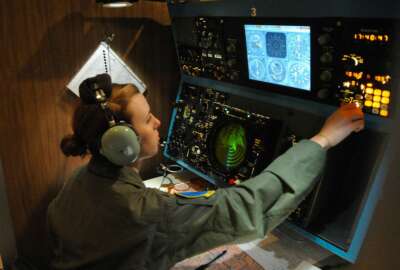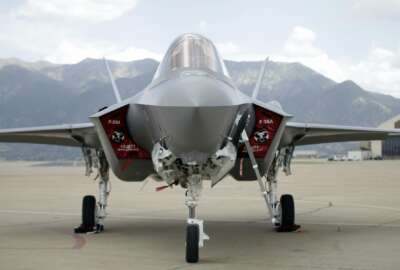
Air Force evolving to buy ideas, not tech
The Air Force is in the middle of a major acquisition reform. Part of that is trying to learn how to work with tech startups and small businesses.
The Air Force is in the middle of a major acquisition reform. Part of that means trying to learn how to work with tech startups and small businesses.
The Air Force experienced some success with that earlier this year at its first Pitch Day, where it awarded 242 contracts in two weeks. Will Roper, assistant secretary of acquisition for the Air Force, told the Federal Drive with Tom Temin that needs to become the new normal.
“Government credit cards are used to buy things that are considered pretty ordinary … buying cutting edge ideas needs to be ordinary for us today,” Roper said. “So we did our homework on the companies, we made sure that they’re U.S.-based, we made sure that we thought they were viable, that they had a good idea so that when we invited them to come pitch to us, they had already cleared our good-enough-to-get-through-the-gate criteria. But once they got in to pitching to us live, we were really scrutinizing their ideas. So the company had already passed muster. Now we want to understand about the idea.”
And to take that one step further, Roper said when you buy the idea, you’re also buying the team that supports it. Companies need to showcase their teams at a pitch day just as much as their ideas.
Another unique aspect of working with these small companies and startups is that they expect to own their intellectual property, rather than having the government own it. But that’s an aspect that can work to the Air Force’s advantage.
“So one thing that I think will be true in a lot of areas with commercial startups, is we’re not going to need to own their product, we just want to own it as a service and use the fact that they have commercial ambitions to help keep their prices down and keep their impetus to innovate up,” Roper said. “Very different than if you’re a defense company that gets a hold of a unique, boutique-type capability where there’s not competition, and you expect to hold on to it for decades. In the commercial space, we expect there to be very energetic, in some cases, violent competition to try to be market-leading.”
Related Stories
“So this is just the first step on really changing how we the Air Force work in a global ecosystem of commercial technology, and ensure that if you can buy something personally and have it on your phone today, that it’s available for our war fighters that fast,” Roper said.
It’s also important to remember that most startups and small tech companies don’t want to be defense prime contractors. But that doesn’t mean the Air Force can’t be a great first partner, Roper said. After all, the Air Force doesn’t want part ownership, equity, or IP.
“Let’s take, for instance, self-flying cars. So I want to see the Jetsons happen on my watch. Those cars are awesome,” Roper said. “Where have they been? Think about the challenge of operationalizing something like that domestically, getting through all the FAA certifications, the safety certifications, versus coming into the Air Force sphere, where we can pay a higher price point than our commercial counterparts. And we can operate at a different risk profile. Now, why haven’t we put ourselves out as a bridging mechanism from someone that has commercial ambitions and wants to get there and they can walk our defense bridge as one of the paths to achieve it. So that’s an area that I’m working with our research lab right now to look for commercial partnerships, where our money’s important, but our marketplace equally is.”
Copyright © 2025 Federal News Network. All rights reserved. This website is not intended for users located within the European Economic Area.
Daisy Thornton is Federal News Network’s digital managing editor. In addition to her editing responsibilities, she covers federal management, workforce and technology issues. She is also the commentary editor; email her your letters to the editor and pitches for contributed bylines.
Follow @dthorntonWFED





